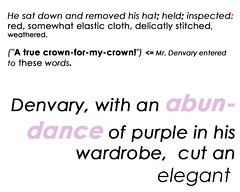I spend a fair amount of time thinking about consciousness and language. Every day I wonder at our ability to manipulate and share information. I’m a piece of the universe thinking about thinking, tossing sounds and keystrokes at other pieces of the whole.
Last year I decided to write a post on Autism in order to focus my arm-chair research on the subject. I never finished my investigation. There were too many conflicting theories, too many platitudes.
Some of the ideas I came across challenged the idea that Autism was a disorder. Autism and Computing (A&C) is “a non-profit group, whose aim is to explore ways of minimizing the effects of a disabling society on people disposed to Monotropism”.
Rather than classifying Monotropism (Autism) as a curable disease or a mental dysfunction, they hypothesis that our society is intolerant (or ignorant) to the wide spectrum of possible mind types. What follows are the notes I gathered while exploring their ideas. The majority of quotes are from the A&C website. There’s no thesis statement here, just personal sepculation. If you have thoughts you’d like to share, personal experience with Autism, or if you’d like to respectfully disagree with me, please leave a comment.
Preamble
When it comes to the mind, we are told by the medical/pharma community that there exists a normal mind type, composed of a normal balance of brain chemicals, along with a normal way to interact with the world. Although physical deviations (appearance, eye colour, height, etc) between humans are understood as natural, mental deviations are presented as ‘flawed’ or ‘repairable’. This is what I call the myth of uniform consciousness.
What is Autism?
“Autism is classified as a neurodevelopmental disorder that manifests itself in markedly abnormal social interaction, communication ability, patterns of interests, and patterns of behavior.” -Wikipedia Entry
Autism and Computing claim instead that “the Autistic spectrum of behaviours is evidence of one extreme of the normal distribution of types of mind that we would expect to find, given the environment in which the human race has evolved”.
This distribution can be seen as a spectrum of minds, with the Monotropic (Autistic) and Polytropic tendencies on either end.
Monotropic/Autistic tendency: Few interests highly aroused;
Evolutionary Advantage: Promotes physical survival in a harsh environment through focused attention.Polytropic tendency: Many interests less highly aroused;
Evolutionary Advantage: Promotes social interaction, and the shifting of attention.
“When many interests are aroused, multiple, complex, behaviours emerge. When few interests are aroused then a few, intensely motivated, behaviours are engendered.”
Interests Compete for Attention
Attention is a limited resource —and a tool— that we use to model our environment. Interests continually compete for our attention. Our focus on, and processing of, these interests allow us to interaction with the world, while exercising our reasoning faculties.
If we continue with the optical metaphor (focus), a Montropic mind studies the world through an interest spotlight, or an attention tunnel. The Polytropic mind does its share of problem-solving by multi-tasking; optically, think fly eyes. ;)
Inner Dialogue
Polytropic individuals sculpt their inner dialogues using their native language, which in turn, strengthens their social dialogue skills. The Monotropic thought process has been described as visually focused, image based even. As such, the Monotropic mind may have little talent for (or interest in) spoken-language.
Autism through Evolution
In our evolutionary past the Monotropic mind held great advantage.
“[The Monotropic mind is] optimised for searching for sustenance in a dangerous environment in which resources are scarce. The attention tunnel which links the unarmed hunter to the prey must be optimised for the immediate high gain high risk opportunity. It must have a propensity to accept what is seen, even when this contradicts what was formerly thought to be known. “
“Such a mind must have a propensity for actual rather than literal information. Such a mind seems to have the will to error, but is in fact the only sort of mind capable of discoveries that go beyond the known and transform situations. Only error making leads to metamorphic discovery.”
Is it any surprise that a large number of scientists, mathematicians, and engineers are said to be “higher-functioning autistics”, (Asperger’s Syndrome)?
Immunity to Mind Viruses
A Meme consists of a self-propagating unit of cultural evolution having a resemblance to the gene (the unit of genetics). Examples might include thoughts, ideas, theories, practices, habits, songs, dances and moods in addition to concepts such as race. -Wikipedia Entry
In Andrew Walker’s paper What is the point of Autism? he hypothesizes that the Monotropic mind is immune to these mind viruses (Memes). He reasons that “Autistic phenotypes do not [communicate by means of memes], because they perceive their universe in terms of the strictly physical and thus memes are cognitively ‘invisible’.”
If this is true, the Monotropic mind lost its evolutionary advantage as we formed ever larger social units. Beginning with large packs of humans, and later with villages, and cities, the Monotropic attention tunnel proved too narrow to process all the nuances of social interactions: words strung into sentences; audible stress, accent, and tone; body language; situation specific cultural rules; &c. Thus, the Monotropic mind was “shut-out” of the social discourse, unable to process the Memes on which our societies/cultures are based.
Flow: Moments of Monotropy
What I call “the zone”, and others label Flow, is well known and much sought-after in the coding and artistic communities.
“When you are in the flow, you concentrate only on what you are doing and you hold all the required details in your head, in the short and middle term memory. Because there are no disturbances inside your own head, all the details are readily accessible to the brain and the brain in general works like a well-oiled machine, the work progresses excellently and working is a pleasure.” -Cringe from crossing a concentrating coder.
Flow is pleasant (and addictive) state of mind that resembles the Monotropy problem-solving stratagem.
For me, Flow occurs when I’m working under constraint.
- Coding: constraint through language, logic;
- Visual Arts: constraint through media, form, colour;
- Composing: constraint through harmony, melody, rhythm.
There is a marked absence of inner dialogue during these moments, which (without external distraction) can last for hours. The combination of constraint and focus lead to rapid processing of feedback, confidence in experimentation, and a motivation of action. When interrupted, not only can it take time to return to the flow state, but it also takes time to switch gears to re-engage the social world. If you disturb me while coding do not be surprised if I act distant, or even rude, my focus is elsewhere.
Endnote
“Mass production culture may have deprived the deep minded of occasion to contribute to society as the pathfinders to physical resources, but it has opened a vast spectrum of new opportunities. It is the deep mind that has the capacity to read, understand and apply the technical manual, to enter into the intricate labyrinth of the logic of the integrated circuit and the computer program. It is the forager mind, insensitive to the way everybody knows things should be done, which creates the paradigm transforming technologies.”
Extra Quote - Ego and Language:
“Ego, ourselves to ourselves, is not the prime mover in our model. We believe that it is the alchemy of language which generates the apparently independent agent, transforming activity into transitive behaviour. We think that the idea of the doing and the done to is one way, just one amongst many ways, in which the world can be imagined. In our model, ego is the spontaneous emergence of a system of images of the imaginer in the imagination. Ego is an emergent property of language, far from the central machinery of mind.”
Links
- In My Language - A view of Autistic language/interaction. [video]
- Mind as a Dynamical System: Implications for Autism
- What is the point of autism?
- Wikipedia Attention
- Flow in Games
- Thinking in Pictures
- Inner Savant
- Play Attention - adhd video game therapy
- Turning off self-awareness
- Autism symptoms reversed in lab








